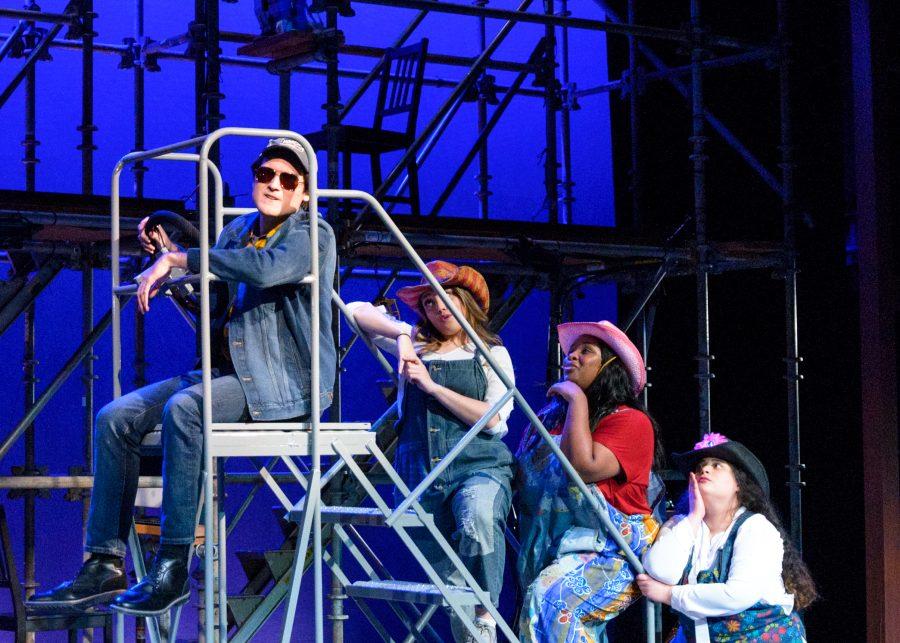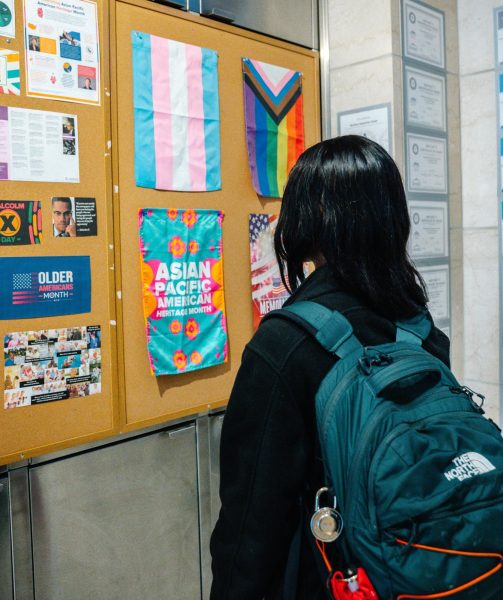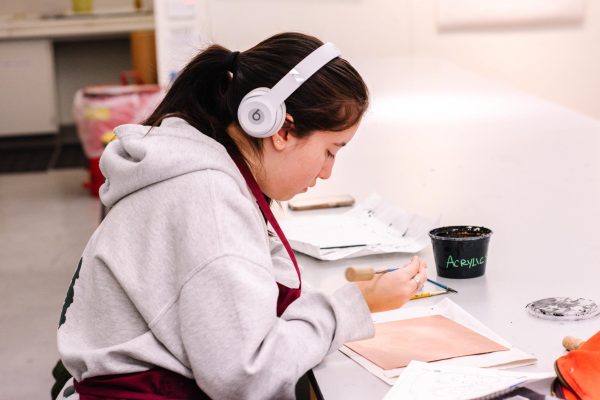UMass Boston Theater Department brings working to the stage
Students performing during the dress rehearsal of UMass Boston’s production of the musical, “Working.” Photo by Olivia Reid / Mass Media Staff
November 24, 2022
After over two years, musical theater finally returns to the Performing Arts Department at UMass Boston. Following the theater shutdowns impacted by COVID-19, UMass Boston’s process to return to a full-scale, yearly production schedule had been slow. The department held in-person performances throughout the 2021-2022 school year; however, they were still held back by COVID-19 restrictions and precautions. The department returned to its full potential in the 2022-2023 year, and made a splash while doing so.
“Working: A Musical” opened to the UMass Boston community and friends on Nov. 16, and ran from Nov. 16 to Nov. 19. Based on a 1974 musical with a similar premise, this revamped 2012 musical follows a group of ordinary people doing ordinary jobs—a teacher, a stay at home mother, a UPS driver, a truck driver and a sex worker, just to name a few—and the highs and lows these ordinary people face. As director for “Working,” Carrie Ann Quinn states in the musical’s program:
“This musical explores the inner struggles and dreams of the worker and the human being. We are all connected and dependent upon each other in this American working society—whether we want to admit it or not. I argue that working is not just a survival tool, but also an urge, or a hunger that we need to feed with both our body and soul.”
The musical features a cast of six characters—three men and three women—who portray a variety of roles and jobs through monologues and songs. These songs were written by a variety of famous musicians, such as Stephen Schwartz, Lin-Manuel Miranda, Micki Grant and James Taylor, which provided a variety of different tones to the musical.
“Working” also features a large, open set consisting of a scaffolding building that could be customized to whatever the scene called for, and portrayed a variety of different needs. Whether it was an office building or just a way to create levels and dynamics amongst the cast, the scaffolding set created a fun, open way to liven up any given scene. Likewise were the easy-to-move sets, like the rolling staircase, cafe table or schoolroom, which came in and out of scenes to perpetuate a specific character’s scene.
Overall, “Working” was such a delight to see and such a warm way to kick off the return to musical theater. The cast was truly incredible and talented, and the plot was so enjoyable and relatable for the college audience. While many college students may not have worked all of the jobs featured in the musical, they could resonate with the feeling of the freedom from having a first job, and the exhaustion from service jobs and everything that goes with them.
One standout scene from the musical was the elementary school teacher’s song, in which she comments on the change in her time of teaching and how children now have lost many of the manners they had before. Though the musical was revised in 2012, many of the same themes hold up nearly ten years later, in the aftermath of COVID-19. Many of the themes feel all the more important and prevalent, especially the teacher, as the teacher has returned to students who spent many of their formative years inside and largely unsocialized.
Another stellar scene was the song featuring the waitress, at the top of Act Two, where she describes needing to keep her schedule and routine entertaining in order to keep from going insane. For those who have worked in food service, there is a certain level of understanding regarding this, especially in the way the waitress “performs” for each table and puts on little shows for herself to keep her job entertaining.
The musical really allowed audience members to get in touch with their place in society and their impact on other workers, as well as those around them. Whether it was a housewife with the line, “what I do is out of fashion, / what I do is out of date,” when reflecting on her struggles in her day-to-day life, the monotony of factory work, the process involved in helping children to break the cycle of working jobs like housekeeping, or the constant cycle of working from age sixteen to death, “Working” left audience members with an optimistic outlet and a lot to think about.
The show concludes with a song about giving credit to everyone who puts in the work, rather than just the people who pay the money to have their name on the building, and it serves as a beautiful way to wrap up the show. “Working,” in its purest form, pays tribute to everyone and every job, something that is rarely done in modern times.
Though the Theater Department at UMass Boston has wrapped up its performances for the fall semester, auditions for the spring semester will begin at the beginning of next semester. Auditions are open to all students and all majors, and for more information on upcoming auditions and performances, keep an eye on the Performing Arts department’s website and social media.






























































